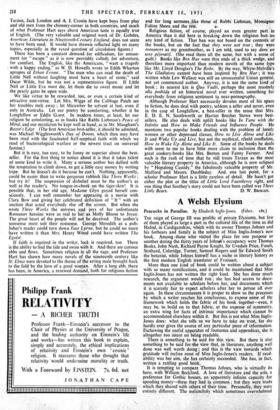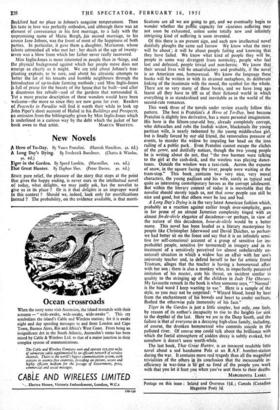A Welsh Elysium
Peacocks in Paradise. By Elisabeth Inglis-Jones. (Faber. 18s.)
THE reign of George III was prolific of private Elysiums, but few of them played as large a part in the cultural life of the time as did
Hafod, in Cardiganshire, which with its owner Thomas Johnes and his forbears and family is the subject of Miss Inglis-Jones's new book. Among .those who visited the place for one purpose or another during the thirty years of John's occupancy were Thomas Banks, John Nash, Richard Payne Knight, Sir Uvedale Price, Fuseli, Stothard, Coleridge, Turner, Samuel Rogers and Sir Edward Smith the botanist, while Johnes himself has a niche in literary history as the first modern English translator of Froissart. More than one kind of book could be written about a subject with so many ramifications, and it could be maintained that Miss Inglis-Jones has not written the right 'kind. She has done much research, the argument would run • she has had access to docu- ments not available to scholars before her, and documents which it is scarcely fair to expect scholars after her to peruse all over again. In these circumstances it is proper to show us the processes
by which a writer reaches his conclusions, to expose some of the framework which holds the fabric of his book together—even, it may be, to build on to that fabric, at the expense of symmetry, an extra wing for facts of intrinsic importance which cannot be accommodated elsewhere within it. But this is not what Miss Inglis' Jones does: what she tells us we have to take on trust, for she hardly ever gives the source of any particular piece of information. Eschewing the useful apparatus of footnotes and appendices, she is altogether too intent on being readable.
There is something to be said for this view. But there is also something to be said for the view that, in literature, anything well done was well worth doing ; and this is the view towards which gratitude will incline most of Miss Inglis-Jones's readers. If read- ability was her aim, she has certainly succeeded. She has, in fact, written a rattling good book.
It is tempting to compare Thomas Johnes, who is virtually its hero, with William Beckford. A love of literature and the arts, a preference for Gothic houses, an apparently infinite capacity for spending money—these they had in common ; but they were traits which they shared with others of their time. Personally, they were entirely different. The melancholy which sometimes overwhelmed
peckford had no place in Johnes's sanguine temperament. Then his taste in love was perfectly orthodox, and although there was an clement of convenience in his first marriage, to a lady with the unpromising name of Maria Burgh, his second marriage, to his cousin Jane Johnes, was the fount of most of the happiness of both parties. In particular, it gave them a, daughter, Mariamne, whose talents astonished all who met her; her death at the age of twenty- 'seven was a blow from which her father never really recovered.
Miss Inglis-Jones is more interested in people than in things, and the physical background against which her people move does not emerge as clearly as it might. We are told about Johnes's tree- planting exploits, to be sure, and abotit his altruistic attempts to better the lot of his tenants and humble neighbours through the Introduction of up-to-date farming methods : and Miss Inglis-Jones is full of praise for the beauty of the house that he built—and after tt disastrous fire rebuilt—and of the gardens that surrounded it. Yet a more precise description of these wonders would have been welcome—the more so since they are now gone for ever. Readers of Peacocks in Paradise will find it worth their while to look up John Piper's short account of Hafod in his Buildings and Prospects, an omission from the bibliography given by Miss Inglis-Jones which is underlined in a curious way by the debt which the jacket of her



































 Previous page
Previous page